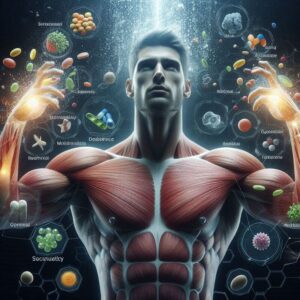Unlock the Power of Nutrition to Enhance Muscle Recovery: Proven Strategies
The precise macronutrient ratios within your diet are essential for achieving peak muscle recovery after rigorous workouts. The three core macronutrients—protein, carbohydrates, and fats—are not merely energy sources; they serve as the fundamental building blocks of your body’s structural composition and are crucial for various physiological functions. Each macronutrient has a unique role in the repair and regeneration of muscle tissue. Therefore, anyone committed to improving their athletic performance and recovery must grasp how these nutrients collaborate to optimize recovery and overall health.
Among these, protein stands out as particularly vital for muscle recovery due to its composition of essential amino acids that are critical for effective muscle repair and growth. Ensuring adequate protein intake post-exercise can significantly boost muscle protein synthesis, which is the process where new muscle proteins are created while concurrently minimizing the breakdown of existing proteins. This delicate equilibrium is crucial for successful muscle recovery, facilitating quicker healing and adaptation to training stress. Additionally, carbohydrates are indispensable for replenishing glycogen stores that are diminished during intense workouts, supplying the energy necessary for subsequent training sessions. Lastly, fats play a pivotal role in energy production and hormone regulation, both of which are essential for effective muscle recovery.
Establishing the ideal macronutrient ratio for muscle recovery requires a personalized strategy, considering individual factors such as body composition, workout intensity, and specific fitness objectives. A general recommendation is to consume a combination of protein and carbohydrates within 30 minutes to 2 hours post-exercise to optimize recovery. This timing is crucial, as your body experiences an elevated state of nutrient absorption during this recovery window, making it the ideal moment to fuel your muscles with the nutrients they need.

Explore Top Protein Sources to Enhance Muscle Recovery Effectively
Recognizing that protein is not just a dietary element but a crucial factor in muscle recovery is vital for anyone involved in physical training. It provides essential amino acids necessary for both muscle repair and growth, making it imperative to include protein-rich foods in your diet to enhance muscle recovery. High-quality sources of animal protein, such as eggs, dairy products, lean meats, fish, and poultry, deliver complete amino acid profiles that are particularly beneficial for muscle regeneration and recovery.
For individuals who prefer plant-based options or wish to diversify their protein sources, numerous excellent alternatives exist. Foods such as lentils, chickpeas, and black beans are not only nutrient-dense but also abundant in protein, contributing positively to muscle recovery. Furthermore, the versatility of tofu, tempeh, edamame, and other soy-based products makes them outstanding complete protein sources that can be seamlessly incorporated into a well-balanced diet to support muscle healing and growth.
Additionally, protein supplements like whey, casein, or plant-based powders can be incredibly effective for boosting your protein intake specifically aimed at muscle recovery. These supplements offer a convenient method to ensure you meet your post-workout protein requirements, allowing for easy incorporation into your favorite smoothies, shakes, or meals, thereby maximizing your recovery potential.
Replenish Glycogen Levels with Carbohydrates for Optimal Muscle Recovery
Carbohydrates play a critical role in muscle recovery by replenishing glycogen stores that are depleted during vigorous physical activity. Consuming carbohydrates within the first 30 to 60 minutes post-exercise can significantly aid in restoring energy levels and accelerating the muscle regeneration process. During intense workouts, your muscles primarily depend on glycogen as their main energy source, and the body is most efficient at storing glucose immediately after exercise. Consequently, the timing of your carbohydrate intake is crucial and can greatly impact muscle glycogen synthesis and overall recovery outcomes.
Incorporating a variety of nutrient-dense foods such as legumes, fruits, and vegetables, which are high in natural sugars and starches, can greatly enhance your muscle recovery while offering numerous health benefits. These foods are rich in fiber and packed with essential nutrients, providing a steady release of energy along with the vitamins and minerals necessary for overall health and effective recovery. By prioritizing these complex carbohydrates in your meals, you can make informed dietary choices that significantly contribute to your body’s nutritional needs.
Proper post-exercise nutrition is a critical component of muscle recovery. Combining carbohydrates with protein can dramatically enhance muscle glycogen resynthesis and promote effective muscular repair. This powerful nutrient combination also triggers insulin release, facilitating the transport of glucose and amino acids into muscle cells, which further improves recovery and repair processes.

Incorporate Healthy Fats for Comprehensive Muscle Recovery
While protein and carbohydrates often dominate conversations about muscle recovery, dietary fats are equally important for a holistic approach to recovery and overall body function. Healthy fats are essential for hormone production, particularly testosterone, which plays a significant role in muscle growth and repair. Foods rich in omega-3 fatty acids, such as walnuts, flaxseeds, and fatty fish, offer anti-inflammatory benefits that can mitigate exercise-induced inflammation and expedite muscle recovery. Additionally, these fatty acids are vital for constructing cell membranes that are necessary for effective muscle repair.
Incorporating a diverse range of healthy fat sources, including nuts, seeds, avocados, olive oil, and fatty fish, can provide substantial benefits for both your overall health and muscle regeneration. These fats are not only flavorful but can also be included in your post-exercise meals or snacks, supplying the necessary energy while supporting various physiological processes associated with recovery. Explore different options and make a conscious effort to include healthy fats in your diet; your muscles will undoubtedly appreciate the effort!
While fats play an important role in a balanced diet, moderation is essential. It’s crucial to avoid excessive consumption of unhealthy fats, such as trans and saturated fats, as these can elevate inflammation levels and hinder overall healing and performance. Therefore, achieving the right balance of fats in your diet is vital for optimal muscle recovery.
Recognize the Critical Importance of Hydration for Muscle Recovery
One of the most frequently overlooked components of muscle recovery is the vital role of hydration. During physical activity, our bodies lose fluids through sweating, and neglecting to replenish these lost fluids can lead to dehydration. This condition can severely impair performance and prolong muscle recovery time. Dehydration adversely affects nutrient transport to muscles, heightens the risk of cramping, and may even lead to muscle damage.
Maintaining sufficient hydration not only supports muscle recovery but also enhances overall health and well-being. Proper fluid intake aids in nutrient transportation, regulates body temperature, and assists in waste elimination. Ensuring that you remain well-hydrated before, during, and after exercise is essential for facilitating muscle recovery. While water is the most effective hydration solution, consider incorporating electrolyte-rich beverages like sports drinks or coconut water to replenish lost electrolytes during intense physical exertion.
Being attuned to your body’s hydration signals is crucial for maximizing recovery. Monitoring indicators such as urine color, fluctuations in body weight, and sensations of thirst can provide valuable insights into your hydration status. This self-awareness can help you maintain optimal fluid intake, thus promoting maximal muscle repair. Additionally, incorporating more water-rich foods, such as fruits and vegetables, can further enhance your hydration and recovery efforts.

Identify Essential Micronutrients to Accelerate Muscle Recovery
Understanding the significance of micronutrients, which encompass essential vitamins and minerals, is critical for effective muscle recovery and overall health. These micronutrients are not optional supplements; they are vital components that influence various physiological processes, including exercise performance and recovery. For example, the antioxidant properties of vitamin C can help alleviate the inflammatory and oxidative stress that occurs during exercise, while vitamin D is crucial for maintaining bone health and facilitating muscle function.
Key minerals such as iron, magnesium, and zinc play instrumental roles in energy production, oxygen transport, and muscle functionality during physical activity. To promote optimal muscle repair, it is imperative to consume a balanced diet rich in fruits, vegetables, whole grains, lean meats, and healthy fats.
While athletes might consider supplementing with specific micronutrients to combat deficiencies or meet the increased demands of intense training, it is vital to seek professional guidance. Consulting with a healthcare professional or a certified dietitian before starting any supplementation regimen can ensure both safety and effectiveness, leaving you feeling more informed and confident in your dietary decisions.
Ultimately, food plays a pivotal role in muscle recovery following strenuous physical activity. Striking the right balance among macronutrients—including protein, carbohydrates, and fats—alongside proper hydration and micronutrient intake is essential for effective muscle regeneration and enhancing athletic performance. By being mindful of your dietary choices and providing your body with the necessary nutrients, you can facilitate quicker healing, reduce the likelihood of injury, and enhance your overall fitness level.
FAQs: Insights into Muscle Recovery and Nutrition
How does the muscle recovery process function?
Muscle recovery refers to the complex and multifaceted process through which muscles repair and rebuild after experiencing physical stress, such as exercise or resistance training. This essential process is crucial for stimulating muscle growth and improving overall physical performance, enabling your body to adapt to the rigors of training effectively.
How does diet influence muscle recovery?
Your diet is a fundamental factor impacting muscle recovery, as it supplies the necessary nutrients that facilitate muscle repair and growth. Achieving the optimal balance among macronutrients (protein, carbohydrates, and fats) and micronutrients (vitamins and minerals) is crucial for maximizing muscle recovery and enhancing overall athletic performance.
What dietary approach is best for optimal muscle recovery?
The most effective diet for muscle recovery typically features a balanced combination of high-quality protein, carbohydrates, and healthy fats. Foods rich in protein, such as lean meats, fish, eggs, and dairy products, are particularly beneficial for supporting muscle repair and growth. Carbohydrates are essential for providing energy for workouts and replenishing depleted glycogen stores, while healthy fats support overall health and hormone production.
What is the recommended protein intake for enhancing muscle recovery?
The general guideline for protein intake aimed at muscle recovery ranges from 1.2 to 2.2 grams of protein per kilogram of body weight per day. This range can vary based on individual factors, including activity level, muscle mass, and specific training goals.
Are there specific foods that can improve muscle recovery?
Foods high in protein, such as chicken, turkey, salmon, eggs, Greek yogurt, and tofu, are particularly effective in supporting muscle recovery. Additionally, incorporating complex carbohydrates from sources like whole grains, fruits, and vegetables, along with healthy fats from avocados, nuts, and olive oil, can further aid in muscle recovery and enhance overall athletic performance.
Should I consider using supplements to support muscle recovery?
While a nutritious, well-balanced diet can generally provide the essential nutrients needed for muscle recovery, some individuals may benefit from supplementing with protein powders, branched-chain amino acids (BCAAs), or creatine to support their recovery and performance objectives. It is crucial to consult with a healthcare professional before introducing any supplements into your diet to ensure both safety and effectiveness.
This valuable information is brought to you by:
Trusted References for Muscle Recovery and Nutritional Insights
Nourish Your Hair: Protein Intake and Hair Health. https://www.theproteinfactory.pk/blog/protein-and-hair-health/
The Maximum Calorie Intake to Lose Weight | Woman – The Nest. https://woman.thenest.com/maximum-calorie-intake-lose-weight-17436.html
The Article: Optimal Diet for Muscle Recovery appeared first on Acupuncture Cottam.
The Article Muscle Recovery: The Optimal Diet You Need appeared first on https://mcrtherapies.com
The Article Optimal Diet for Muscle Recovery You Need Was Found On https://limitsofstrategy.com


I really appreciate the emphasis on the macronutrient ratios and how each plays a role in muscle recovery! It reminds me of my own experience with training and nutrition. I used to focus so heavily on protein intake, thinking it was the magic bullet for recovery. While it’s undeniably crucial, I found that my recovery improved significantly when I started paying more attention to my carb intake, especially after intense workouts.
It’s great to hear about your journey with training and nutrition. So many people get caught up in the protein hype and forget the vital role carbohydrates play in recovery. They’re like the fuel for your muscles after a tough workout, helping to replenish glycogen stores and support overall recovery. I’ve found that balancing protein and carbs really makes a difference—especially combining them post-workout to maximize recovery. Have you noticed any specific carb sources that you prefer for post-workout meals?
It’s interesting how our understanding of nutrition evolves over time, isn’t it? Your experience really highlights the importance of a balanced approach to macronutrients, particularly with carbs. I’ve found that carbs often get a bad rap in fitness circles, but they truly are pivotal, especially for fueling recovery after tough workouts.
It’s interesting how focusing on the right macronutrient ratios can really elevate our fitness game after 40; I found some great tips on optimizing not just protein, but carbs and healthy fats for recovery in a recent article you might find useful.
‘Stay in Shape After 40: 5 Essential Fitness Tips’
https://pier3.org/stay-in-shape-after-40-5-essential-fitness-tips/.
You make an excellent point about the evolving understanding of nutrition. It’s intriguing how perspectives on macronutrients shift over time. I remember a phase when low-carb diets were all the rage, and many seemed convinced that cutting out carbs entirely was the key to fitness. But as we learn more, it’s clear that carbs play a vital role in fuel and recovery, especially as we age.
I really appreciate your perspective on the evolving understanding of nutrition. It’s fascinating how what we once thought was a strict guideline—like limiting carbs—has transformed into a more nuanced conversation about the role they play, especially for those of us over 40. I’ve also noticed that when we shift our focus towards the quality and timing of carbs, rather than just the quantity, our energy levels and recovery can drastically improve.
This topic of nutrition and its essential role in muscle recovery resonates with me on multiple levels, as I’ve experienced firsthand the profound impact that proper nutrition can have on athletic performance. Understanding the specific functions of macronutrients has been a game changer in my approach to training and recovery.
You’ve really tapped into something essential with your experience illustrating how nutrition can shift performance. The specific functions of macronutrients are often overlooked, but they truly lay the foundation for both training and recovery.
I really appreciate how you’ve broken down the roles of macronutrients in muscle recovery. It reminds me of how overwhelming it can be to figure out the right balance, especially when you’re knee-deep in a workout regimen. I’ve always been fascinated by nutrition and how it intersects with fitness, but I felt like I was fumbling around in the dark for a long time, trying to decode the best ways to fuel my body.
Your insights into the crucial role of macronutrients in muscle recovery really resonate with me. I’ve found that nutrition often plays a more significant part in my training regimen than I initially recognized. When I first started focusing on my fitness, I thought that as long as I was hitting the gym consistently and pushing myself during workouts, the recovery would just take care of itself. But I learned the hard way that ignoring nutrition can be a huge mistake.
It’s great to hear that you’ve had that realization about nutrition—it’s a game changer for sure. When you first dive into fitness, it’s so easy to think that just grinding it out at the gym is enough. And I get it; that focus on the hustle feels productive. But the truth is, our bodies are more like intricate machines that need the right fuel to operate well, especially when it comes to recovery.